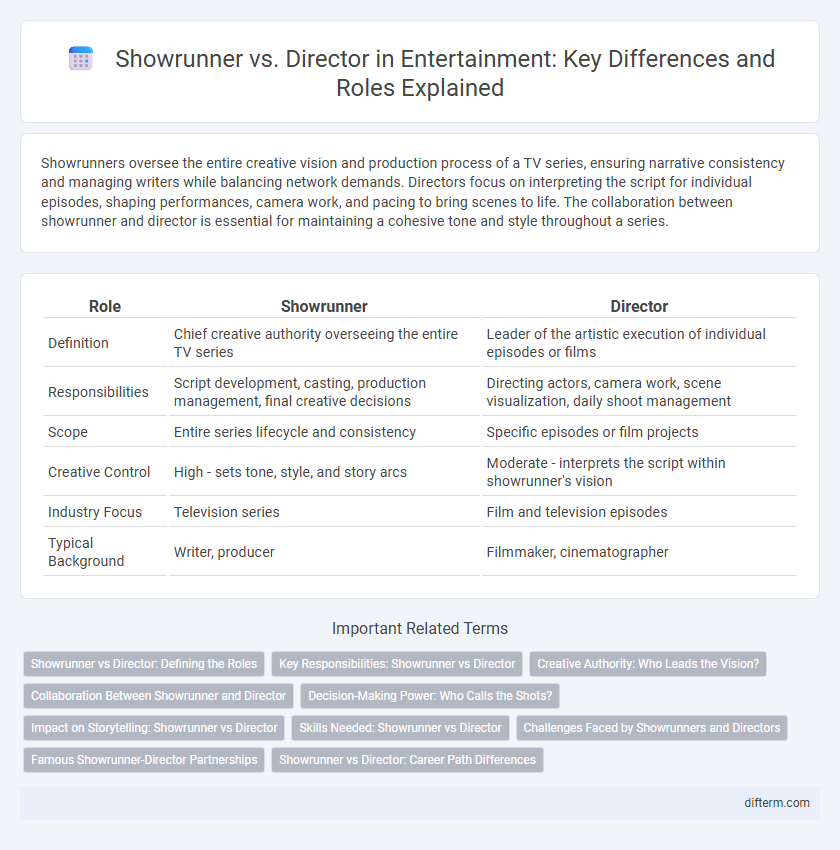Showrunners oversee the entire creative vision and production process of a TV series, ensuring narrative consistency and managing writers while balancing network demands. Directors focus on interpreting the script for individual episodes, shaping performances, camera work, and pacing to bring scenes to life. The collaboration between showrunner and director is essential for maintaining a cohesive tone and style throughout a series.
Table of Comparison
| Role | Showrunner | Director |
|---|---|---|
| Definition | Chief creative authority overseeing the entire TV series | Leader of the artistic execution of individual episodes or films |
| Responsibilities | Script development, casting, production management, final creative decisions | Directing actors, camera work, scene visualization, daily shoot management |
| Scope | Entire series lifecycle and consistency | Specific episodes or film projects |
| Creative Control | High - sets tone, style, and story arcs | Moderate - interprets the script within showrunner's vision |
| Industry Focus | Television series | Film and television episodes |
| Typical Background | Writer, producer | Filmmaker, cinematographer |
Showrunner vs Director: Defining the Roles
The showrunner is the chief creative authority responsible for the overall vision, script supervision, and production management of a television series, ensuring narrative consistency and character development. The director focuses primarily on the execution of individual episodes, managing actors' performances, camera work, and scene composition to bring the script to life visually. While the showrunner governs the series' long-term arc, the director handles the artistic and technical details of episode production.
Key Responsibilities: Showrunner vs Director
Showrunners hold primary responsibility for the overall creative vision, script development, and day-to-day production management of a television series, ensuring narrative consistency and coordinating with writers, producers, and networks. Directors focus on executing specific episodes or scenes, managing the cast and crew on set, directing performances, and overseeing cinematography, lighting, and shot composition. While showrunners maintain control of the storytelling arc and production logistics, directors bring the script to life visually within the established framework.
Creative Authority: Who Leads the Vision?
Showrunners hold primary creative authority, overseeing the entire vision, script development, and production logistics, ensuring consistency across episodes. Directors focus on executing individual episodes, shaping performances, camera work, and pacing within the framework established by the showrunner. The showrunner's role integrates storytelling cohesion, while the director emphasizes visual storytelling for specific segments.
Collaboration Between Showrunner and Director
The collaboration between a showrunner and director is essential for a cohesive entertainment production, as the showrunner oversees the overall narrative and creative vision while the director handles the execution of each episode's visual storytelling. This partnership ensures consistency in tone, pacing, and character development across the series, aligning the artistic and logistical elements. Strong communication and shared understanding between the showrunner and director drive successful episode delivery and viewer engagement.
Decision-Making Power: Who Calls the Shots?
The showrunner holds ultimate decision-making power in television production, overseeing creative and managerial aspects to ensure the series' vision and consistency. Directors primarily focus on executing specific episodes, managing on-set performances, camera work, and technical crews within the showrunner's established framework. This dynamic places the showrunner as the key authority authority who calls the shots, shaping the overall narrative and production direction.
Impact on Storytelling: Showrunner vs Director
The showrunner shapes the overarching vision and narrative consistency throughout a series, ensuring character development and plot arcs align with the intended tone and themes. The director focuses on executing individual episodes, interpreting the script visually, and guiding actors' performances to bring specific scenes to life. This collaboration between showrunner and director directly impacts storytelling by balancing long-term narrative cohesion with dynamic, immersive episode-level direction.
Skills Needed: Showrunner vs Director
Showrunners require strong leadership, storytelling vision, and management skills to oversee the entire production process, including script development, casting, and post-production. Directors need expertise in visual storytelling, scene composition, actor direction, and technical knowledge of camera work and lighting to execute each episode effectively. Both roles demand excellent communication and problem-solving abilities, but showrunners focus more on long-term narrative coherence while directors concentrate on the creative execution of individual scenes.
Challenges Faced by Showrunners and Directors
Showrunners grapple with maintaining a cohesive narrative across episodes while managing multiple writers, budgets, and production schedules, demanding strong leadership and multitasking skills. Directors face challenges in interpreting the script visually, coordinating actors and crew, and meeting tight deadlines to deliver a polished final product. Both roles require balancing creative vision with practical constraints to bring a successful television or film project to life.
Famous Showrunner-Director Partnerships
Famous showrunner-director partnerships often shape the creative vision and success of television series, with collaborations like Vince Gilligan and Bryan Cranston on "Breaking Bad" exemplifying seamless storytelling and direction. The showrunner's role in overseeing narrative and production complements the director's focus on visual execution, creating a cohesive and compelling audience experience. Iconic partnerships such as David Benioff and D.B. Weiss with Miguel Sapochnik on "Game of Thrones" demonstrate how strategic collaboration elevates complex storytelling through direction and showrunning expertise.
Showrunner vs Director: Career Path Differences
Showrunners typically advance from writing and producing roles, developing a deep understanding of storytelling and production logistics, while directors often start as assistant directors or in cinematography, focusing on visual execution and actor performances. Showrunners oversee the entire creative and operational aspects of a television series, managing scripts, budgets, and schedules, whereas directors concentrate on interpreting the script and guiding the cast during specific episodes or films. Career paths diverge as showrunners build long-term leadership in series production, while directors often pursue varied projects with a focus on directing style and artistic vision.
showrunner vs director Infographic

 difterm.com
difterm.com